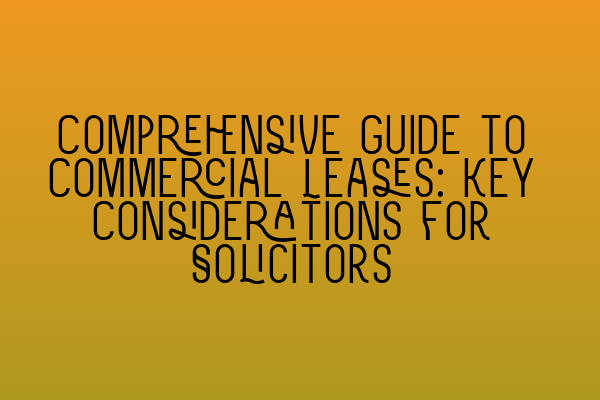Comprehensive Guide to Commercial Leases: Key Considerations for Solicitors
Welcome to the comprehensive guide to commercial leases! As a solicitor, it is essential to have a strong understanding of the key considerations when dealing with commercial leases. In this guide, we will walk you through the important aspects of commercial leases, providing you with the necessary insights to navigate this complex area of property law.
1. Understanding Commercial Leases
Before diving into the key considerations, let’s start with the basics. Commercial leases are legal agreements between a landlord and a tenant that outline the terms and conditions for renting a commercial property. Unlike residential leases, commercial leases are often more intricate and require careful attention to detail.
These leases typically cover a wide range of commercial properties, such as retail stores, office spaces, industrial warehouses, and restaurants. As a solicitor, it is crucial to familiarize yourself with the specific laws and regulations governing commercial leases in your jurisdiction.
2. Essential Elements of a Commercial Lease
To ensure a commercial lease is robust and provides adequate protection for your clients, it is essential to address the following key elements:
a) Lease Term
The lease term specifies the duration of the lease agreement. It is imperative to clearly define the start and end dates, along with any provisions for renewal or termination.
b) Rent and Additional Charges
The rent amount should be clearly stated, along with any provisions for rent increases over time. Additionally, outline any additional charges, such as utilities, maintenance fees, or common area expenses, and determine whether they are included in the rent or paid separately.
c) Use and Restrictions
Specify the permitted use of the commercial property and any restrictions or limitations. It is crucial to ensure that the tenant’s business activities align with the permitted use stated in the lease agreement.
d) Repairs and Maintenance
Clearly define the responsibilities for repairs and maintenance, outlining who is responsible for specific tasks and how any costs will be divided between the landlord and tenant.
e) Alterations and Improvements
If the tenant wishes to make alterations or improvements to the premises, establish the procedures and requirements for obtaining permission from the landlord.
f) Insurance and Indemnity
Outline the insurance requirements for the commercial property, including liability coverage. Additionally, clarify the indemnity provisions, specifying which party is responsible for any damages or losses.
g) Assignment and Subletting
Address the provisions for assigning or subletting the property, including any requirements for obtaining the landlord’s consent.
h) Dispute Resolution
Include clauses regarding dispute resolution, such as mediation or arbitration, to ensure a streamlined process for resolving any conflicts that may arise during the lease term.
3. Due Diligence and Negotiation
When representing a client in a commercial lease transaction, it is crucial to conduct thorough due diligence and engage in effective negotiation. Here are some key points to consider:
a) Title Investigation
Ensure that the landlord holds a valid title to the commercial property and that there are no encumbrances or legal issues that may affect the tenant’s rights.
b) Survey and Inspection
Conduct a survey and inspection of the premises to identify any structural issues or concerns that may impact the tenant’s use of the property.
c) Negotiating Lease Terms
Work closely with your client to negotiate favorable lease terms, taking into consideration their specific business requirements and budgetary constraints. It is crucial to strike a balance that protects your client’s interests while ensuring a mutually beneficial agreement for both parties.
4. Lease Renewal and Termination
As the lease term approaches its end, you must guide your client through the lease renewal or termination process. Here are some important considerations:
a) Lease Renewal
If your client wishes to renew the lease, review the terms and conditions, negotiate any necessary changes, and formalize the renewal agreement.
b) Lease Termination
If your client intends to terminate the lease, ensure that all legal obligations and notice requirements are met. Additionally, assist your client in mitigating any potential liabilities or disputes that may arise from the termination.
5. Staying Updated and Continual Professional Development
Property law is constantly evolving, and it is imperative to stay updated with the latest legal developments and changes in commercial lease regulations. Participate in relevant seminars, workshops, and webinars to enhance your knowledge and skills in this area.
At SQE Property Law & Land Law, we offer comprehensive SQE 1 and SQE 2 preparation courses to help you excel in your legal career. Our courses are designed to provide you with the knowledge and skills required to succeed in the SQE exams. Check out our SQE 1 Practice Exam Questions and SQE 1 Practice Mocks FLK1 FLK2 to boost your preparation.
Stay informed about upcoming SRA SQE exam dates with our regularly updated SRA SQE Exam Dates article, and be ready to ace the exams with our comprehensive SQE 2 preparation courses.
In conclusion, commercial leases require meticulous attention to detail and thorough understanding of the key considerations. By following this comprehensive guide, you will be well-equipped to assist your clients in navigating the complexities of commercial lease transactions and ensuring their legal rights and obligations are protected.
